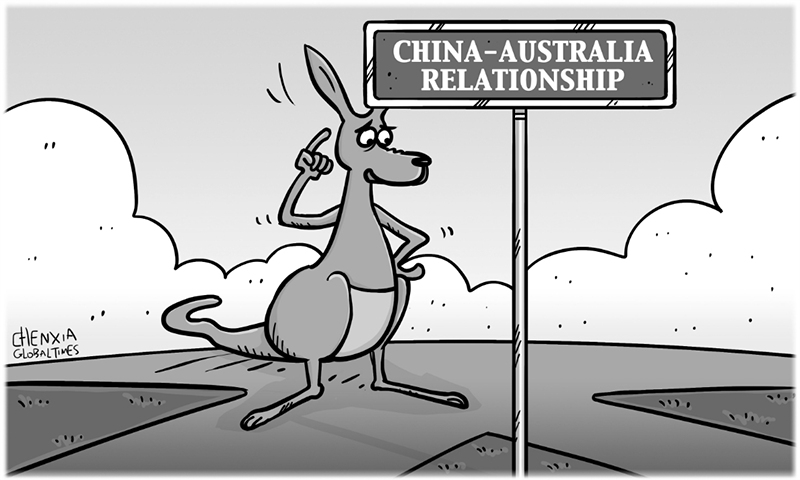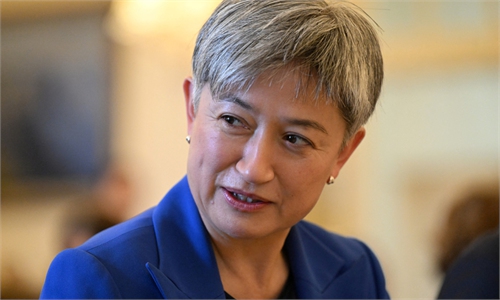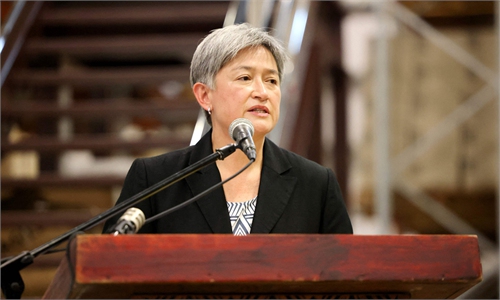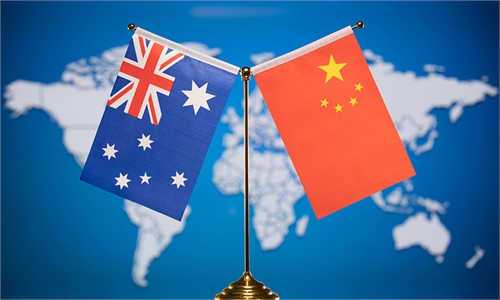
Australia Illustration: Chen Xia/GT
Editor's Note:December 21 this year marks the 50th anniversary of the establishment of diplomatic ties between China and Australia. With the meeting between Chinese President Xi Jinping and Australian Prime Minister Anthony Albanese last month in Bali, and Australian Foreign Minister Penny Wong's China visit this week, people are wondering if these will start a process of repairing the bilateral relationship, which hit the lowest ebb during Scott Morrison's administration. The Global Times collected several scholars' Oped on the prospects of China-Australia relations and how Australia will balance between China and the US in the future.
Pro-US undercurrents hinder China-Australia ties
By Chen Hong
In 1971, Gough Whitlam shocked the Australian political circle with his whirlwind visit to China as the opposition party leader. That visit, later called "a stroke of genius," led to Australia's judicious recognition of the People's Republic of China and the prompt establishment of formal diplomatic relations between the two countries in the following year after he took the office of prime ministership in Canberra. In the 50 years that passed, bilateral relations between China and Australia have grown and developed into a comprehensive strategic partnership, "a successful story of friendship and cooperation … (which) has been mutually beneficial," in the words of China's ambassador to Australia, Xiao Qian.
China's momentous development has benefited from proactive cooperation with Australia in various areas, in particular, economically and socially. Moreover, people-to-people exchanges have contributed to cultural diversity and dynamism in both countries.
However, the previous Liberal-National Coalition government of Australia stunned the world in recent years by vigorously spearheading the anti-China campaign launched by Washington in order to maintain and strengthen the hegemony of the US in the Asia-Pacific region and the world. The constructive and productive relationship between the two countries was devastated by the Turnbull and Morrison administrations for the sake of their allegiance to the US, with no regard of Australia's own long-term national interests. The bilateral relationship has now spiralled downward to an all-time low, with the alarming prospect of a possible total breakdown as Canberra started to make frequent threats of war with China.
Since the new Labor government took office after winning the federal parliament election in May this year, Canberra has demonstrated a noticeably different outlook and approach in Australia's foreign policies. The new prime minister, Anthony Albanese, has been expressly articulating his opposition to the previous government's unnecessary and extremely toxic hostility toward China.
Ministerial level dialogues have resumed, leading up to the ground-breaking meeting between President Xi Jinping and Albanese during the G20 summit in mid-November, which, as Australia's Foreign Minister Penny Wong commented, signifies "an important step toward the stabilization of our relationship." Australian ambassador to China, Graham Fletcher, sanguinely predicted that "step-by-step discussions on consular matters, defense, trade, education, movement of people, investment, law enforcement and the economy" will proceed to return to their normalcy.
With the spirit of equal positivity, China is willing to work with Australia proactively to steer the bilateral relationship back to the right track, which will definitely benefit both countries and peoples, in particular against the background of post-COVID economic recovery.
China is the biggest destination for Australia's mineral and energy exports. Australian-made high quality food and diary products are top of the shopping list for Chinese consumers, while students and tourists here have already been making plans for education and holiday-making in Australia with the imminent easing of COVID restrictions on international travel.
While there are undeniably various differences in the political systems, social governance and cultures between our two countries, there are more importantly convergence of interests and common ground upon which we are able to pursue a more constructive and productive partnership.
There are, however, still some adverse undercurrents in Australia which are resistant to the ongoing efforts on both sides to reset and improve the bilateral relations. Some negative elements have been acting at the behest of the anti-China forces in the US to pose as hindrances to the tide of history. From time to time, they collude to provoke confrontation and challenge China's core national interests. The recent visit by some Australian members of Parliament to Taiwan island is apparently one of such deleterious attempts to sabotage the Albanese government's efforts to stabilize its relationship with China.
It is therefore important for the Australian government to be vigilant, and to manifestly resist such vile conspiracies. At the prospect of the warming up of the bilateral relations, Canberra needs to contribute by putting in more firewood, instead of dampening the warmth by tolerating or even encouraging any harmful or damaging attempts.
It is therefore worthwhile for us to appreciate the foresight and wisdom of Whitlam when he said during his visit to China in 1973 that "there are great benefits for all in putting aside the rigidities and animosities of the Cold War era and grasping the opportunities inherent in the more open framework of relationships now developing in the world, to build a structure of cooperation based on mutual respect and mutual trust."
The author is president of the Chinese Association of Australian Studies and director of the Australian Studies Centre at East China Normal University. opinion@globaltimes.com.cn
Australia must assert itself before the US, not just taking orders
By Bruce Haigh
I have been asked to write an op-ed on the 50th anniversary of the establishment of diplomatic relations between China and Australia, an event which I remember gave many people in Australia great satisfaction.
I was a new Third Secretary on a posting to Islamabad, Pakistan, when I learnt of the establishment of diplomatic relations. It was a development we had anticipated as university students and as junior diplomats greeted it with relief and anticipation of positive things to come. And, as we know, until very recently this was the case. Throughout my diplomatic career I enjoyed warm and close relations with my Chinese diplomatic colleagues, particularly in Pakistan and Afghanistan, between 1972 and 1973 and between 1986 and 1988.
My generation of young Australian diplomats looked forward to a much closer relationship with Asia and Africa. Even in 1972 China was seen by us as the key. Prime Minister Whitlam threw off the shame of our involvement in the American war in Vietnam, which was a disaster and negatively affected not only our relations in Asia but also in Europe and Africa.
Our future seemed tied to Asia until Whitlam was dismissed from office. Some speculated that this was done by the US and UK, who became concerned that Whitlam might move against what they perceived as their long-term strategic interests centered around the US defense intelligence gathering facility of Pine Gap in the Northern Territory.
This has had the effect of making some in the Labor Party become shy of the US. The exception being former Labor Prime Minister Paul Keating, who still offers thoughtful and positive analysis of what should be Australian foreign policy toward the region. He advocates for strong regional relationships particularly with China.
The current Australian Labor Prime Minister, Anthony Albanese has, on poor advice, rejected Keatings analysis. Luckily, he has a Foreign Minister, Penny Wong, who sees things differently. She understands the diplomatic realities of the region. However, she struggles to have her voice heard. Unluckily Australia has a Defense Minister, Richard Marles, who gives every indication of having been captured by the US industrial/military complex. He is close to the right wing, partially US funded Australian Strategic Policy Institute (ASPI), a self-styled think tank motivated by Sinophobia.
This leads into the question that was put to me, 'How will Australia dance between China and the US? China is Australia's biggest trading partner, in addition, over the past fifty years strong cultural, academic and familial ties have been established. However, all have been put in jeopardy by Australia's unquestioning loyalty to what is termed the US-Australia alliance. It is a one-sided relationship with Australia happy to play the role of a vassal. This arrangement comes despite the lessons of Vietnam, Iraq and Afghanistan, wars which America lost and in which Australia participated.
For the leadership of both major political parties in Australia, the US can do no wrong. This stems from a national lack of self-confidence constantly requiring bolstering from success in international sporting competition. Australia understands the concept of physical courage, it is mythologized in what is termed the ANZAC tradition relating to feat of arms in WWI and WWII, what it does not understand, applaud or encourage is moral courage. This deficit is apparent in the inability to push back against pressure from the US for Australia to demonize China. It also casts Australia as a follower, not a leader, obvious in its recent panicked dealings in the Pacific.
Underlying racism, fear of the unfamiliar coupled with an inferiority complex sees Australia susceptible to US fear mongering over the China "threat." This threat has been peddled by the mainstream media in the US, the UK and Australia. It has led to the American creation of AUKUS, a tri-lateral security pact whose intentions and activities for the most part remain secret. Details have not been tabled in the Australian parliament, the lack of which challenges the Australian democratic process.
From leaks to the media, it appears AUKUS is an arrangement to allow the US greater access to Australian territory and defense facilities from which to confront and perhaps attack China. It is ill-conceived and does nothing to enhance Australian security or diplomatic undertakings in the region.
AUKUS was said to be about the acquisition of nuclear submarines by Australia but the lag times on delivery are so long as to make that contention risible. Far more likely it would appear that talk of Australian submarines is a smokescreen for the basing of US nuclear submarines in Australia.
The biggest single problem in Australia getting back into rhythm with China and resuming a nice easy quick step is getting America to desist applying pressure on Australia. America is unlikely to pull back, its goal is the containment of China using Taiwan as the bait. Australia must assert itself and to do that Prime Minister Albanese needs to realize that if he stays on his present path Australian sovereignty is at risk, if it hasn't already been undermined. He needs to get a greater, independent and more sophisticated understanding of the region and China.
This is where China also has a role in not haranguing the Australian government but taking a more benign approach as one would with a pupil trying to get on top of a subject and catch up with assignments.
The author is a retired Australian diplomat and political commentator. opinion@globaltimes.com.cn
Despite differences, there are many areas the two countries' interests align
By James Laurenceson
Last month's meeting between Australian Prime Minister Anthony Albanese and Chinese President Xi Jinping meant that an optimistic note can now be struck on December 21st, the 50th anniversary of the establishment of diplomatic ties between the two countries. It was the first formal meeting of leaders in more than six years.
Yet blockages to greater mutual benefit remain in place. And in a relationship as large and complex as that between Australia and China, new garden-variety irritants will inevitably emerge.
Beyond this, a more industrial-sized challenge for both capitals is to arrive at a new understanding around the US.
It was, after all, such an understanding between former leaders, John Howard and Jiang Zemin, in 1996, that turned the corner on an earlier period of tension.
Howard told Jiang that while Australia would remain an unapologetic US ally, the purpose of the security pact with Washington was "not in any way directed against China". It was an arrangement that Beijing could live with.
But this understanding has broken down and mutual distrust now runs deep.
Many in Beijing see the AUKUS technology-sharing partnership as confirmation that Canberra has turned its back on the Howard-Jiang understanding and embraces lining up with Washington to contain China.
Meanwhile, in Canberra the consensus is that "China has changed". Reflecting on Jiang's passing earlier this month, Howard himself contended, "It's different now". In Australia's capital AUKUS is no doubt seen as significant development but also fundamentally a continuation of a long-standing and prudent balancing strategy. Indeed, by assuaging security concerns, AUKUS provides Australia with the confidence needed to maintain a position of welcoming China's rise.
So, what might a new Australia-China understanding around the US look like?
First, it would start with grounded expectations.
The reality is that Australia sees its interests served by the US playing a more prominent role in determining the regional order than China would like. This locks in a degree of mutual tension.
Both sides need to recognise and accept this difference as legitimate. To that end, in a webinar hosted by the Australia-China Relations Institute at the University of Technology Sydney last week, it was pleasing to hear Madame Fu Ying, a towering figure in Chinese diplomacy, emphasise that, "China has no intention to force Australia to choose against any other country".
Second, bad faith characterisations should be avoided.
For example, Beijing could still register objections to Australia seeking access to US nuclear-propelled submarine technology without claiming that Canberra desires nuclear weapons.
Third, consistency in international dealings must be demonstrated.
In 2016, Canberra led calls for China to abide by an unfavourable arbitration decision on its island-building activities in the South China Sea. The justification was that this call was part of a principled commitment to defending the 'rules-based order' and a world where might does not make right. But Canberra cannot then be silent on US belligerence towards that same order, such as the Biden's administration's statement earlier this week that it has no intention of bringing itself into compliance with rulings by the World Trade Organization (WTO).
And if AUKUS and other arrangements such as the Quad are indeed just prudent balancing measures, then Canberra cannot at the same time join efforts by Washington aimed at China's containment, such as cutting it off from the critical mineral supply chains that Australian miners and processors currently feed into.
Similarly, in the absence of a favourable WTO ruling, Beijing cannot maintain disruptive trade measures that single out Australian exporters. And in the absence of clear evidence of criminality, it is time for detained Australians like the journalist Cheng Lei to be released.
These second and third steps will allow the re-establishment of a minimum level of trust.
Finally, to move beyond this minimum level, new cooperative endeavours - with or without US involvement - need to be unfurled. Australia opening a discussion with China on joining the CPTPP trade pact is just one possibility.
At the UTS: ACRI webinar, Australia's ambassador to China, Graham Fletcher, spelt out a long list of topics he was keen to start discussing with Chinese interlocutors. The fact this list was long makes the point: for all the differences, there are still plenty of areas where the two countries' interests align.
The author is director of the Australia-China Relations Institute at the University of Technology Sydney. opinion@globaltimes.com.cn



